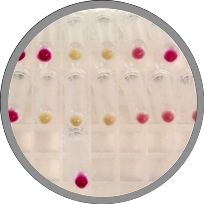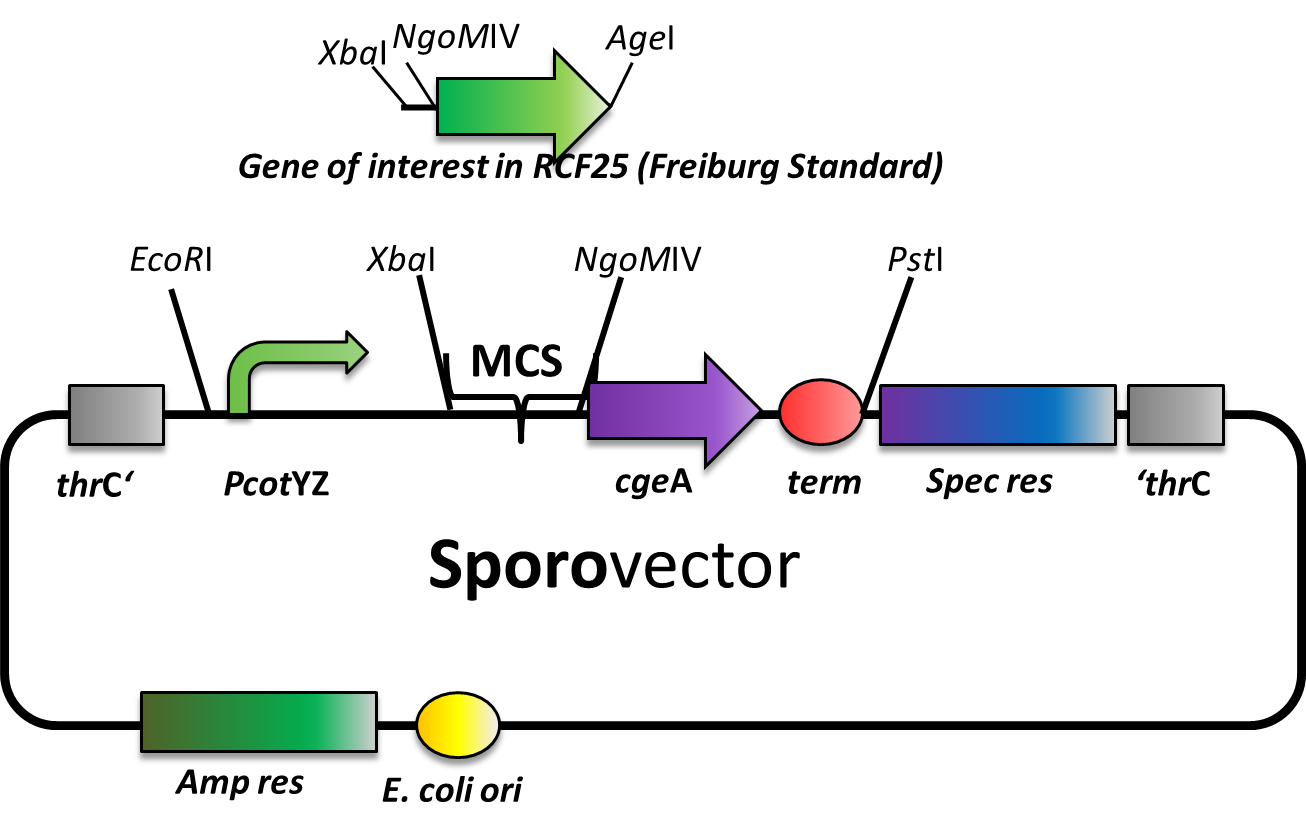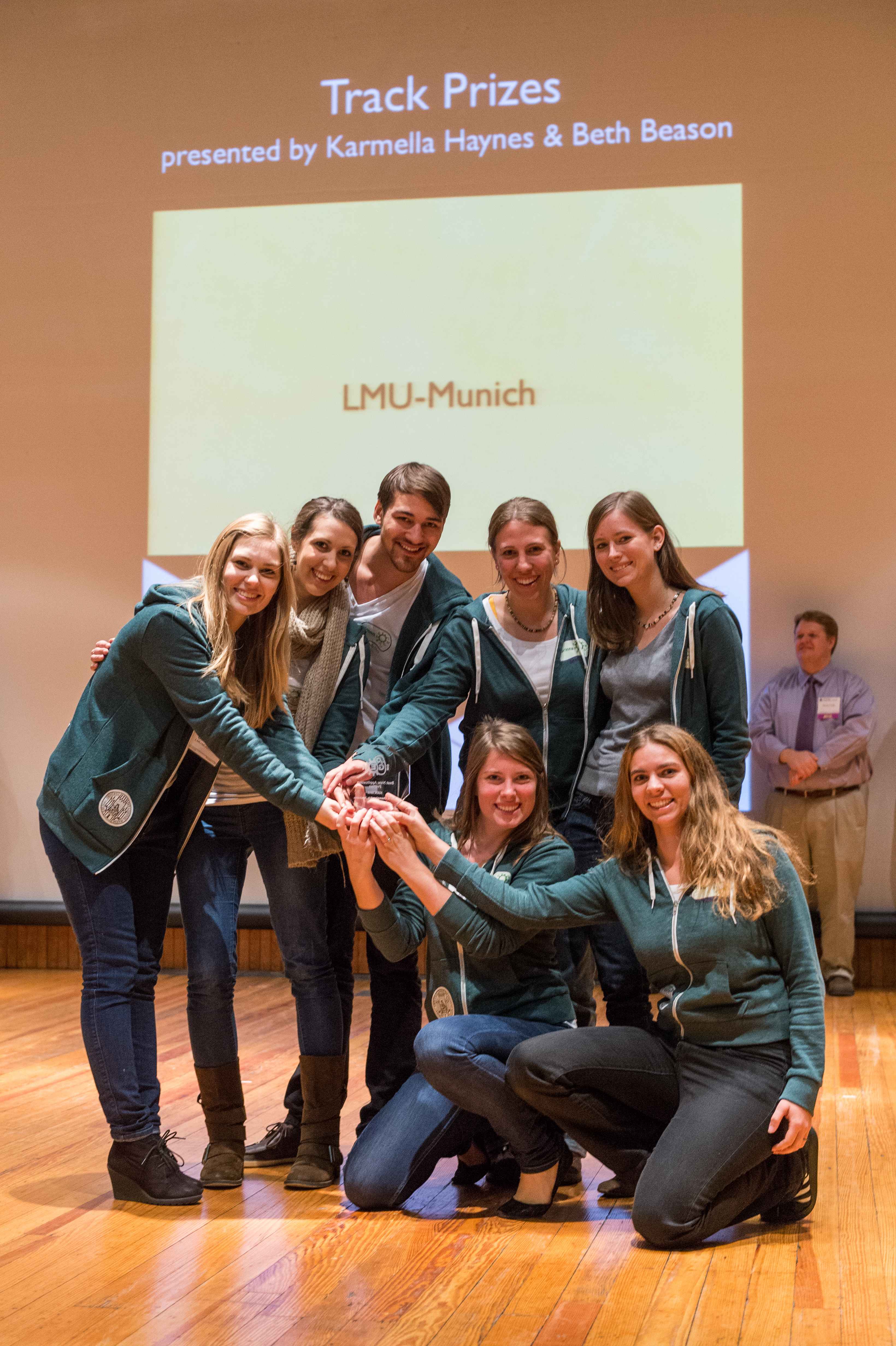Team:LMU-Munich/Bacillus BioBricks/Sporovector
From 2012.igem.org
| Line 2: | Line 2: | ||
=='''Sporo'''vector== | =='''Sporo'''vector== | ||
| - | + | <p align="justify"> | |
Our '''Sporo'''vector is specially designed to give you the opportunity to easily create Sporobeads with any proteins you can think of. It is available as BioBrick in pSB1C3 and can be cloned in any of our empty ''B. subtilis'' vectors. We also offer it “precloned” in pSB<sub>Bs</sub>4S which in this version lacks ''NgoM''IV restriction sites. | Our '''Sporo'''vector is specially designed to give you the opportunity to easily create Sporobeads with any proteins you can think of. It is available as BioBrick in pSB1C3 and can be cloned in any of our empty ''B. subtilis'' vectors. We also offer it “precloned” in pSB<sub>Bs</sub>4S which in this version lacks ''NgoM''IV restriction sites. | ||
[[File:Sporovectorcloning.png|600px]] | [[File:Sporovectorcloning.png|600px]] | ||
The '''Sporo'''vector was created by ligation of three cut PCR-products. It is designed to allow N-terminal fusion of genes in Freiburg standard ([http://dspace.mit.edu/bitstream/handle/1721.1/45140/BBF_RFC%2025.pdf?sequence=1 RCF25]). Therefore, the gene to be inserted must be cut with ''Xba''I and ''Age''I and the vector must be digested with ''Xba''I and ''NgoM''IV. By this digest, the RFP cassette will be removed from this vector to allow easy selection for the integration of the new insert. After ligation, there is a scar of six nucleotides between both genes but no restriction site left. | The '''Sporo'''vector was created by ligation of three cut PCR-products. It is designed to allow N-terminal fusion of genes in Freiburg standard ([http://dspace.mit.edu/bitstream/handle/1721.1/45140/BBF_RFC%2025.pdf?sequence=1 RCF25]). Therefore, the gene to be inserted must be cut with ''Xba''I and ''Age''I and the vector must be digested with ''Xba''I and ''NgoM''IV. By this digest, the RFP cassette will be removed from this vector to allow easy selection for the integration of the new insert. After ligation, there is a scar of six nucleotides between both genes but no restriction site left. | ||
| + | |||
The gene fusion is controlled by the P<sub>''cot''YZ</sub>-promoter which was the strongest one in our promoter evaluations. The C-terminal gene part is ''cge''A, one of the two known spore crust proteins. | The gene fusion is controlled by the P<sub>''cot''YZ</sub>-promoter which was the strongest one in our promoter evaluations. The C-terminal gene part is ''cge''A, one of the two known spore crust proteins. | ||
| - | + | </p> | |
| + | <p align="justify"> | ||
The vector is cloned but has not been tested with an insert, yet. | The vector is cloned but has not been tested with an insert, yet. | ||
We are working on further '''Sporo'''vectors to offer also fusion with ''cot''Z as well as C-terminal fusions. | We are working on further '''Sporo'''vectors to offer also fusion with ''cot''Z as well as C-terminal fusions. | ||
| - | + | </p> | |
Back to our [[Team:LMU-Munich/Bacillus_BioBricks |'''''Bacillus''B'''io'''B'''rick'''B'''ox]] | Back to our [[Team:LMU-Munich/Bacillus_BioBricks |'''''Bacillus''B'''io'''B'''rick'''B'''ox]] | ||
Revision as of 18:30, 24 September 2012

The LMU-Munich team is exuberantly happy about the great success at the World Championship Jamboree in Boston. Our project Beadzillus finished 4th and won the prize for the "Best Wiki" (with Slovenia) and "Best New Application Project".
[ more news ]

Sporovector
Our Sporovector is specially designed to give you the opportunity to easily create Sporobeads with any proteins you can think of. It is available as BioBrick in pSB1C3 and can be cloned in any of our empty B. subtilis vectors. We also offer it “precloned” in pSBBs4S which in this version lacks NgoMIV restriction sites.
 The Sporovector was created by ligation of three cut PCR-products. It is designed to allow N-terminal fusion of genes in Freiburg standard ([http://dspace.mit.edu/bitstream/handle/1721.1/45140/BBF_RFC%2025.pdf?sequence=1 RCF25]). Therefore, the gene to be inserted must be cut with XbaI and AgeI and the vector must be digested with XbaI and NgoMIV. By this digest, the RFP cassette will be removed from this vector to allow easy selection for the integration of the new insert. After ligation, there is a scar of six nucleotides between both genes but no restriction site left.
The gene fusion is controlled by the PcotYZ-promoter which was the strongest one in our promoter evaluations. The C-terminal gene part is cgeA, one of the two known spore crust proteins.
The Sporovector was created by ligation of three cut PCR-products. It is designed to allow N-terminal fusion of genes in Freiburg standard ([http://dspace.mit.edu/bitstream/handle/1721.1/45140/BBF_RFC%2025.pdf?sequence=1 RCF25]). Therefore, the gene to be inserted must be cut with XbaI and AgeI and the vector must be digested with XbaI and NgoMIV. By this digest, the RFP cassette will be removed from this vector to allow easy selection for the integration of the new insert. After ligation, there is a scar of six nucleotides between both genes but no restriction site left.
The gene fusion is controlled by the PcotYZ-promoter which was the strongest one in our promoter evaluations. The C-terminal gene part is cgeA, one of the two known spore crust proteins.
The vector is cloned but has not been tested with an insert, yet. We are working on further Sporovectors to offer also fusion with cotZ as well as C-terminal fusions.
Back to our BacillusBioBrickBox
 "
"



